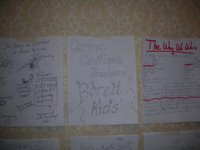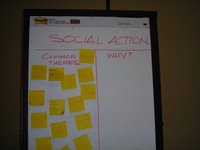Writing for a Change

It's a toss-up for me when I think about what my favorite session was at the NWP conference. I was enlightened by the NTI session, but inspired and moved by the Writing for a Change- Boosting Literacy and Learning through Social Action, which is also the title for the book that we received at the end of this session.
Jenie Fleming from The Centre for Social Action at De Montfort University, Leicester, England came all the way to Nashville to spread the power and impact Social Action can have on students, teachers, and their community.
The core of Social Action, in my words, focuses on empowering young people, helping them take responsibility for themselves, community, problems, things they care about, and things they want to change. Blame is not a part of this, but rather moving forward to make things better through collective problem solving. The problem can be as small as "who's stealing the pencils in the classroom" to "why is our school falling apart, and why do we not have basic supplies?" Adults are not leaders in this process, but facilitators, asking the correct questions to get students on the right track to solving the problem of focus and taking action. This action of course includes a process of letter writing, reflective writing, public speaking, discussion and eventually action.
Women presenting at this conference proved that Social Action is relevant and effective no matter what the location, size, or makeup of the school and community. Elizabeth Davis of DC facilitates her middle school students in social action for equal educational opportunities, giving them a voice and power over their own education (see "The March on Philp Sousa, Chapter 10).Activities in my round table session included "But Why" (pg. 127 in the book, since I know you'll buy it now), and "Movie Poster, pg. 121. These activities got us to the heart of things we would like to see change in for our own schools or districts.



0 Comments:
Post a Comment
<< Home